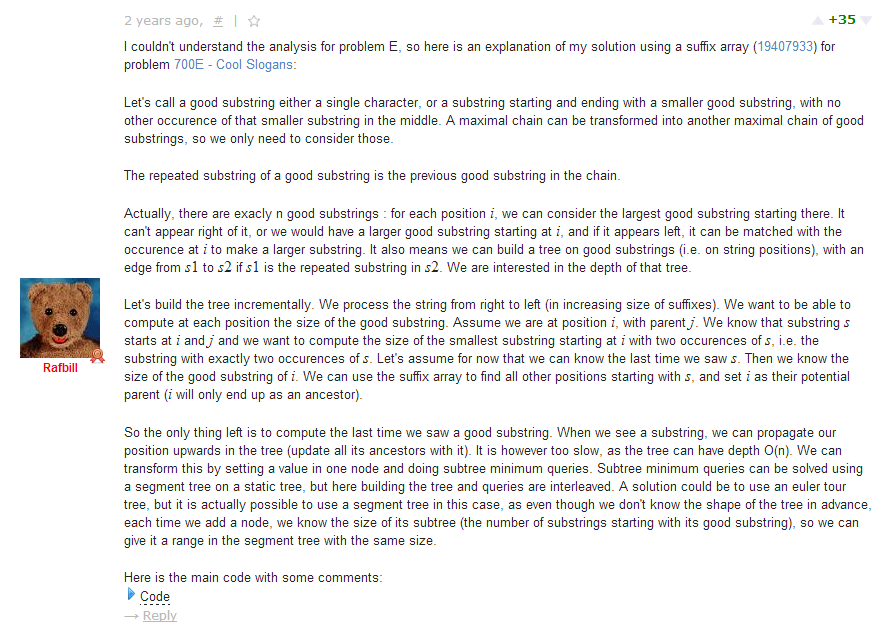(Description)
给定一个字符串(s[1])。一个字符串序列(s[ ])满足(s[i])至少在(s[i-1])中出现过两次((igeq 2))。求最大的(k),满足存在(s[1]sim s[k])。
(|s[1]|leq2 imes10^5)。
(Solution)
一开始以为直接自底向上合并right,如果|right|>1就继续向上。这显然不对啊,这样出现次数>1不一定是在之前的子节点中出现次数>1。
如果串(A)出现在串(B)中两次,那么说明什么?用(right(即endpos))表示一个串出现位置的最右端点集合,则(right(A))在(s[right(B)-len(A),right(B)])中至少出现过两次。
而且对于在原串中在任意位置出现的(B),(A)都满足上面的条件。
所以我们随便找一个(pos[B]=某一个right(B)),(A)若在(B)中出现至少两次则满足(right(A))在(s[pos[B]-len(B)+len(A),pos[B]])中至少出现了两次((s)为原串)。
所有节点的(right)我们可以通过线段树合并全部得到。
(parent)树上的父节点能转移到子节点。可以看出从上到下的DP,如果满足条件则更新,用(B)(子节点)作为新的(A)(下次匹配作为父节点);不满足条件则保留之前的(A)(之前的父节点 更优)。
因为父节点(A)已经至少在子节点(B)中出现过一次了,所以只需要查(s[pos[B]-len(B)+len(A),pos[B]-1])中是否存在(right(A))((A)的线段树中在该区间是否有值)。
(注意虽然(A)这里表示一个节点,似乎显然是用(mnlen(A))更正确,而不是用(A)节点最长的串的长度(len(A)),但是...实际上是没问题的,因为既然同在(A)节点...就有些奇妙的性质。不放心就写(mnlen)吧)
还是有一种神奇hash做法。。见CF status。
顺便还有一种SA做法:

//249ms 131600KB
#include <cctype>
#include <cstdio>
#include <cstring>
#include <algorithm>
//#define gc() getchar()
#define MAXIN 300000
#define gc() (SS==TT&&(TT=(SS=IN)+fread(IN,1,MAXIN,stdin),SS==TT)?EOF:*SS++)
typedef long long LL;
const int N=2e5+5;
char IN[MAXIN],*SS=IN,*TT=IN;
inline int read()
{
int now=0;register char c=gc();
for(;!isdigit(c);c=gc());
for(;isdigit(c);now=now*10+c-'0',c=gc());
return now;
}
struct Segment_Tree
{
#define ls son[x][0]
#define rs son[x][1]
static const int S=N*2*25;//最好是4nlogn...
int tot,son[S][2];
void Insert(int &x,int l,int r,int p)
{
/*if(!x)*/ x=++tot;
if(l==r) return;
int m=l+r>>1;
if(p<=m) Insert(ls,l,m,p);
else Insert(rs,m+1,r,p);
}
bool Query(int x,int l,int r,int L,int R)
{
if(!x) return 0;
if(L<=l && r<=R) return 1;//有这个节点即可
int m=l+r>>1;
if(L<=m)
if(m<R) return Query(ls,l,m,L,R)||Query(rs,m+1,r,L,R);
else return Query(ls,l,m,L,R);
else return Query(rs,m+1,r,L,R);
}
int Merge(int x,int y)
{
if(!x||!y) return x|y;
int now=++tot;//!
son[now][0]=Merge(ls,son[y][0]), son[now][1]=Merge(rs,son[y][1]);
return now;
}
};
struct Suffix_Automaton
{
static const int S=N<<1;
int n,tot,las,len[S],pos[S],son[S][26],fa[S],tm[S],A[S],root[S],f[S],top[S];
Segment_Tree T;
Suffix_Automaton() {tot=las=1;}
void Insert(int c,int id)
{
int np=++tot,p=las;
len[las=np]=len[p]+1, pos[np]=id;
for(; p&&!son[p][c]; p=fa[p]) son[p][c]=np;
if(!p) fa[np]=1;
else
{
int q=son[p][c];
if(len[q]==len[p]+1) fa[np]=q;
else
{
int nq=++tot;
len[nq]=len[p]+1, pos[nq]=pos[q]/*!*/;
memcpy(son[nq],son[q],sizeof son[q]);
fa[nq]=fa[q], fa[q]=fa[np]=nq;
for(; son[p][c]==q; p=fa[p]) son[p][c]=nq;
}
}
}
void Solve()
{
n=read(); register char c=gc(); for(;!isalpha(c);c=gc());
Insert(c-'a',1),T.Insert(root[las],1,n,1);
for(int i=2; i<=n; ++i) Insert(gc()-'a',i),T.Insert(root[las],1,n,i);
for(int i=1; i<=tot; ++i) ++tm[len[i]];
for(int i=1; i<=n; ++i) tm[i]+=tm[i-1];
for(int i=1; i<=tot; ++i) A[tm[len[i]]--]=i;
for(int i=tot,x=A[i]; i>1; x=A[--i]) root[fa[x]]=T.Merge(root[fa[x]],root[x]);
int ans=1;
for(int i=2,x=A[i],tp; i<=tot; x=A[++i])
{
if(fa[x]==1) {f[x]=1, top[x]=x; continue;}
tp=top[fa[x]];
if(T.Query(root[tp],1,n,pos[x]-len[x]+len[tp],pos[x]-1))//or pos[x]-len[x]+len[fa[tp]]+1
f[x]=f[tp]+1, top[x]=x, ans=std::max(ans,f[x]);
else f[x]=f[tp], top[x]=tp;
}
printf("%d
",ans);
}
}sam;
int main()
{
sam.Solve();
return 0;
}